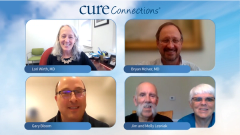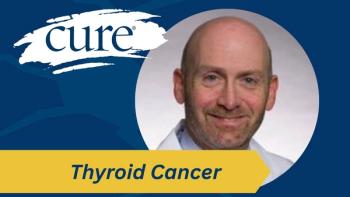
Addressing Unmet Needs in Differentiated Thyroid Cancer
Before closing out their discussion on differentiated thyroid cancer, patients and health care professionals alike consider unmet needs in this space.
Episodes in this series

Transcript:
Lori Wirth, MD: This leads to a question I have for Bryan and then Gary. What do you see as the unmet needs for our patients with advanced thyroid cancer? Where do you see the future going?
Bryan McIver, MD: Unmet needs often are related to education. Patients need to be educated, of course, as do their family members. Most of us make strong efforts to do that, but education also needs to be professional education. It’s not uncommon, for example, for an endocrinologist who does mostly diabetes to be caring for patients with advanced thyroid cancer and not necessarily be aware that we have these systemic therapies available, because they went to medical school and did their residency before these drugs ever came on the scene. If they’re not keeping up to speed, they may not be aware, so patients may not get access to the drug.
Education is critically important around understanding what drugs are available, but also how to determine when it’s time for a patient to receive that drug. I can’t count the number of patients I see who have a thyroid cancer that spreads into areas other than the neck, but the only test they’re getting is a neck ultrasound scan. By the time we discover that the cancer has spread to other sites, it’s late in the journey, and we’ve missed many opportunities to treat. Broad professional education is critical. The other unmet needs, of course, are new drugs that will target some of the other genetic drivers of thyroid cancer. We’ve mentioned some mutations and rearrangements, including the RAS mutations. We don’t have any targeted agents for RAS-driven tumors right now. That’s going to be one of the next big things to come along. In the meantime, thank goodness we have lenvatinib and now cabozantinib available to us to extend people’s lives and maintain a high quality of life, until we come up with that next best thing.
Lori Wirth, MD: I want to piggyback on that in terms of unmet needs. With some gene-specific therapies, we understand well the reason why those drugs eventually can stop working in some patients. That’s not something we understand at all for this class of multikinase inhibitors, like lenvatinib, sorafenib and cabozantinib, and we definitely need more study in that regard. Gary, from the patient’s and advocate’s points of view, what do you think are areas where there are the greatest unmet need in thyroid cancer?
Gary Bloom, MD: It’s definitely what Bryan said, but I’ll add to that. Things that I think of are when is it time for a patient to seek a second opinion or something more drastic than that, like a change in doctor? We’ve talked a lot from the vantage point of two wonderful, expert physicians who work in centers of excellence. But most of our patients with thyroid cancer are seen by community physicians, primarily endocrinologists, who are treating diabetes as a specialty. I’m the last person who’s going to criticize a physician, but sometimes I’ll meet people who have a disease that’s exceeded the contemporary knowledge of their doctor. Does the doctor have enough time to do research that a patient may have been exposed because they’re communicating with other patients? In many cases, unfortunately, the physician is too busy with his or her practice. That’s a time when a patient should be considering if they need to change what they’re doing, if they need to go seek out a physician who’s more knowledgeable of their journey. An unmet need, to me, is about when it’s time to seek a different level of expertise based on the circumstances I’m experiencing.
Lori Wirth, MD: From the point of view of someone who has a very large practice of patients with advanced thyroid cancer, not everybody can travel to Boston or Tampa or New York City or Houston for their care. All of us in this field, we’re all in this together. We want what’s best for every patient, and we’re always happy to help with the providers in the community. We have patients’ doctors reaching out to us all the time for advice. I think I speak for all of my colleagues in the field that we’re happy when patients’ physicians do that. For the patients out there, don’t be shy to ask your doctor to reach out and phone a friend.
With that, Jim and Molly, you get the last word. You’ve shared so many words of wisdom. If nothing else, I’m going to figure out a way to bottle your positive attitude and ability to cope with difficult circumstances and make my fortune selling it. I’d love to hear what other advice you have for patients, or for doctors taking care of patients like you, or for Gary who runs ThyCa [Thyroid Cancer Survivors’ Association].
Jim Lesniak: Have a good sense of humor and keep positive. We were with our surgeon on my second surgery, and I asked her if she could put a spring in my neck so I could be a bobblehead. During the third surgery, Molly said, can you put a zipper in there so you don’t have to keep cutting. We’ve been like that ever since. You have to go with the flow. If you don’t, you’re going to…
Molly Lesniak: You’re going to sit in a rocking chair and wait to die. A lot depends on your attitude, with positivity to what you’re facing, looking at it from the perspective the glass is half full instead of the glass is half empty. We’re lucky because he has the best care, between Dr Wirth, Karen and Dr Ross, we’re very comfortable, and you have to be comfortable with your physician. Back home, there aren’t a lot of choices for endocrinologists.
Jim Lesniak: Yeah. We travel three hours, one way, to get to Boston. That’s on a good day. It’s a haul, but we’re both retired, so we can do it. It’s worth it. I’m a firm believer that if I didn’t make it out there, I’d be in the ground.
Molly Lesniak: We didn’t have a lot of confidence with the care that he would have gotten back home. We were blessed that his sister was able to get us in to see Dr Stevens within two days of his diagnosis. For anybody who’s looking, if you can get to one of the Medicare medical centers, if your insurance covers it, that has a lot to do with it too. We’re lucky that we have good insurance that allows us to go where we need to go. Not everybody is that lucky.
Jim Lesniak: As I said, keep a good sense of humor, and you’ll get through it.
Lori Wirth, MD: Jim and Molly, we’ve been blessed to have you join us. One of the great privileges about taking care of patients with thyroid cancer is that our patients live for a while, and it’s such a pleasure and a real honor to get to know our patients and their family members and for our patients to become our good friends. It’s been special for me to do this with you two. Thank you very much. Thank you, Gary Bloom and Dr Bryan McIver. Thank you for joining us and for sharing your insightful perspectives. To our viewing audience, we hope you found this secure Expert Connections program to be rich and informative.
Transcript edited for clarity.





